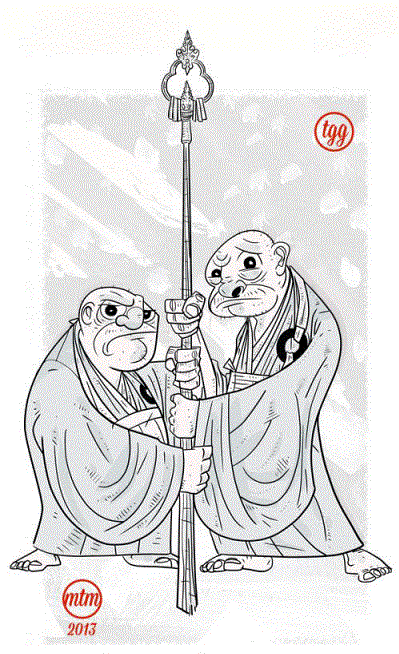ZEN MESTEREK ZEN MASTERS
« Zen főoldal
« vissza a Terebess Online nyitólapjára
![]()
芭蕉慧清 Bajiao Huiqing (10th c.)
(Hangul:) 파초혜청 Pacho Hyecheong
(Rōmaji:) Bashō Esei
(Magyar:) Pa-csiao Huj-csing
Tartalom |
Contents |
Túl a Seholkapun Pa-csiao mondásaiból |
BAJIAO HUIQING |
Bajiao Huiqing de Yingzhou (Hubei) était un Coréen de Sylla, l'un des trois royaumes de la Corée. Il appartint à la cinquième génération de l'école de Gui-Yang. Il étudia avec le maître de dhyâna Guangyong de la Pagode du sud (Nanta) au mont Yangshan (Jiangxi). Il est célèbre pour ces propos qu'il tenait en montrant un bâton : « Si tu as un bâton, je te le donne, si tu n'as pas de bâton, je te prends le bâton. »
BAJIAO HUIQING
by Andy Ferguson
In: Zen's Chinese Heritage: The Masters and Their Teachings, Wisdom Publications, pp. 278-280.
BAJIAO HUIQING (n.d.) was a disciple of Nanta Guangyong. He came from Korea. At the age of twenty-eight, he arrived at Mt. Yang in Yuanzhou (now Yichun City in Jiangxi Province) and began studying with Nanta. One day Nanta said to the assembled monks, “All of you, if you are brave, come out from the womb and roar like a lion!”
At these words, Bajiao gained enlightenment.
Bajiao held up his staff and said to the monks, “If you have a staff, I give you a staff. If you don’t have a staff, then I take it away from you.”
Then, using his staff for support, he got down and left the hall.
A monk asked Bajiao, “What is banana juice?” [Bajiao translates as “banana.”]
Bajiao said, “Winter warm, summer cool.”
A monk asked, “What is the blown feather sword?”
Bajiao said, “Come forward three steps.”
The monk said, “What for?”
Bajiao said, “Go back three steps.”
A monk asked, “What phrase does the master have for people?”
Bajiao said, “I’m just afraid you won’t ask.”
Bajiao entered the hall and addressed the monks, saying, “Do you understand? Those who know are few. Take care.”
A monk asked, “What is it when one has a question but doesn’t speak?”
Bajiao said, “Without going out of the monastery, you take a thousandmile journey.”
A monk asked, “What is the self?”
Bajiao said, “Facing south and seeing the Big Dipper.”
Bajiao addressed the monks, saying, “It’s like a person who’s traveling who suddenly encounters a ten-thousand-fathom-deep hole, and moreover, behind him a wild fire is pursuing him. On both sides are forests of thistles. The only way forward is into the hole, and going back means getting burned by the fire. Thistles obstruct both sides. How can a person get out of such a situation? If someone can get out of this, then he is in accord with the transcendent path. If he can’t escape then he’s lost!”
A monk said, “I wish to see if the master can speak of the Way.”
Bajiao said, “I thought it was a merchant on a great ship, but after all it was just a peddler from Dangzhou.”
A monk asked, “Without asking about principles or points of discussion, I invite the master to point directly at the original face.”
Bajiao sat upright, silently.
The monk asked, “Isn’t it that when a thief comes you must beat him, when a guest comes you must greet him? So what do you do when a thief and guest both arrive?”
Bajiao said, “In the room there are a pair of worn-out grass sandals.”
The monk said, “If the sandals are worn out, do they have any use or not?”
Bajiao said, “If you use them, then wherever you go—before you unlucky, behind you misfortune.”
A monk asked, “What is the meaning of ‘concealing the body in the Big Dipper’?”
Bajiao said, “Nine, nine, eight, ten, one.”
Then Bajiao said, “Do you understand?”
The monk said, “I don’t understand.”
Bajiao said, “One, two, three, four, five.”
A monk asked, “What is a phrase that penetrates the dharmakaya?”
Bajiao said, “The first principle cannot be queried. The second principle does not cease.”
The monk said, “I don’t understand.”
Bajiao said, “Get past the third principle, then I’ll show you.”
無門慧開 Wumen Huikai (1183–1260):
無門關 Wumen guan
Túl a Seholkapun
Fordította: Terebess Gábor

Block print by Mark T. Morse (mtm): The Gateless Gate (tgg)44. Pa-csiao vándorbotja*
Pa-csiao így szólt a gyülekezethez:
– Ha van bototok, nesztek még. Ha nincs bototok, ide véle.*拄杖 zhuzhang [Rōmaji: shujō]; Buddha lábát jelképezi
Vö. „Mert akinek van, annak adatik, és akinek nincs, [attól az is] elvétetik, amije van.” Márk 4:25
Pa-csiao mondásaiból
Hamvas Béla fordításai
In: Az ősök nagy csarnoka II. Kína - Tibet - Japán, Medio Kiadó, 2003
Írok, és mégsem írtam egyetlen szót sem. Te talán olvasod, s nincsen a világon senki, aki olvas. Vak és süket vagyok, és meglátok minden színt, és meghallok minden neszt.
---
Pa-Csiao mondta:
- Ha van botod, adok még egyet, ha nincs, azt is elveszem.---
Egy barát Pa-csiaot megkérte, hogy mutassa meg neki eredeti arcát, amelyet semmiféle szándék még nem torzított el.
Pa-csiao a székben hátradőlt, mozdulatlan maradt, és hallgatott.---